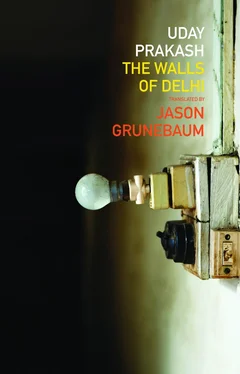In the soulful music, Mohandas and his friends forgot about their sorrows for a little while. Bihari played the dholak, Parmode the manjira. Mohandas, buzzed and feeling good, sang:
Hello mister train man where are you driving your train?
Tell me where you drive your train
And I’ll tell you where you can find me and mine
Tell me your name, your village, where I can find you
Love pushes love along the tracks
Only news about love reaches us way out here
Love makes us dance, our bodies spin, whirl
in this town that’s as conjured up as love, the mirage
Here’s my address, what’s yours?
How can I reach you, mister train driver?
It was two in the morning by the time the women served dinner. Everyone was ravenous. Biran’s sister had used mustard oil to prepare the pork with spices, garlic, onions; the smell filled the entire courtyard. Everyone helped themselves to a roti and dug in. There was also a big pot of rice. Mohandas, however, was silent. It was as if the singing had stuck a little needle in him; he felt a stitch in his chest that he tried to suppress and forget about by drinking more than the rest.
With a handful of food he was about to scoop into his mouth, Mohandas stopped, looked over everyone, and then looked at them once more; a sob then emerged, followed by uncontrollable weeping. Gopaldas, Biran, Bihari and Paramodi were so hungry and it’d been so long since they’d had such a good meal that they were a little bit offended at Mohandas’s outburst. Taking bite after bite of food, they asked while chewing, What’s the matter? Why don’t you eat first?
Mohandas wiped away his tears and asked Biran Baiga, ‘Who are you? What’s your name?’
‘Biran. Biran Baiga,’ Biran said with a laugh.
‘And your father? What’s his name?’ Mohandas continued.
‘My father’s name is Dind-wa Baiga,’ he responded, still laughing. ‘And you’re drunk on the ma-hoo-wa.’
Everyone thought that was funny. Mohandas’s eyes were bloodshot. He plonked his fingerful of food down on the tin thali and raised his voice:
‘Biran, Parmodi — tell me if you can, who am I? And don’t just feed me lines or treat me like an idiot. I want all of you to swear on Malihamai!’
‘You are Mohandas, your father is Kaba, and your mother is Putli,’ Biran said firmly, poking Mohandas in the chest with the finger he’d been eating with. The group began laughing. Mohandas didn’t respond but regarded Biran for a moment before staring down the rest of the group. He wanted to put a stop to his fears about whether these people were who they said they were, or some other people. Then the feeling crept in that they were to a man quite real people who’d been, like him, cheated out of something and, they too, had had the rug pulled out from under them. The only difference was that he’d found out the secret, whereas the rest of them were still in the dark.
Mohandas wanted to instruct his childhood friends to go to government offices, go to skyscrapers and mansions and coal mines and factories in the cities, and to Lenin Nagar, Gandhi Nagar, Ambedkar Nagar, Shastri Nagar, and other residential colonies like them and ask around to see if some imposter has deprived them of their rights and is living there saying that they are them, their father is his father, and they’re from where he is from. But even though he was buzzed he felt that if he told them this they’d just say he was drunk.
His four friends were busy eating. Biran’s wife Sitiya and his sister Ramoli joined them. The two had also been drinking the mahua, and it was all frolic and fun with them, laughing and joking and eating. Mohandas, however, had by then separated from the group, and sat in the corner alone where he’d taken the bottle with him, letting out little sobs between singing verses of Kabir and taking swigs from the bottle.
It was four in the morning when his mates slung Mohandas over their shoulders and took him home. It was the first time Kasturi had seen her husband in this kind of shape. She began castigating Gopaldas and Biran until Gopaldas handed her a thousand rupees and said sorrowfully, ‘I kept saying you’ve had enough, you’ve had enough, but he wouldn’t listen. Take this, it’s the money that fell out of his pocket.’ That quieted her.
It was seven in the morning when Kabadas started with a fierce coughing fit, as if a tornado were stuck in his throat. It showed no sign of abating. Blind Putlibai ran around crazed, like a cow broken loose from its tether. Her cries echoed through the neighbourhood; Kasturi awoke, and tried to shake Mohandas awake. But he was still drunk with mahua and showed no signs of consciousness. She poured a bucket of water over him, causing him to open his eyes. They were as red as if soaked in blood. He was still intoxicated. She screamed, ‘Get up! Go run get a doctor! His cough is deathly!’
Men, women, and children from the village began coming over. Devdas and Sharda stood panicked beside their grandfather’s bed. It was as if his insides had exploded; each cough came with spit full of blood and flesh. Lines of ants began forming on the ground; horseflies began swarming.
Everyone tried to shake the drunken sleep out of Mohandas. It was no easy task, but he finally began steadying himself with his hands and lifting himself up; everything looked terrifying through those bloodshot eyes. He didn’t recognise a soul, and he couldn’t focus. Then suddenly a big grin came over his face. He struggled with all his might to look directly at the man he recognised, Ramai Kaku. Mohandas’s voice came out like gravel: ‘Kaku, who am I, what’s my name, Kaku, tell me, tell me!’ Mohandas then collapsed on the spot into a lifeless heap.
The wails and cries of the village women rose, and Putlibai’s were the loudest. Soon it was a kind of harmony of women’s lament.
Kabadas died. The flies covered the bamboo and cutter under his cot. He’d been up half the night shucking bamboo and it was only yesterday they’d received an order from Vindhyachal Handicrafts to make thirty baskets and fifty winnows.
That morning around seven thirty the cat had pounced on and gobbled up the pair of myna birds out in the open of Kasturi’s room. Mama myna was carrying two eggs in her belly; crushed feathers and drops of blood still littered the earthen floor of the room; the day before Kasturi had covered it with cow dung.
Mohandas, who had been left passed out in the courtyard, wasn’t conscious enough to be aware of how his father’s funeral rites were conducted; he wasn’t there to witness how village and caste elders took Kaba’s body to the cremation ground, how Mohandas’s mother Putlibai kept rapping her forehead on his cot and how she cried while she cleaned his blood and spit from the mattress, basket, and water jug; how little Devdas took the place of his father and lit his grandfather’s cremation pyre, and how his childhood friend Biran Baiga performed the kapal-kriya, the ceremonial breaking of the skull. Mohandas knew nothing of this. The low-caste gosain priest shook Kasturi down for five hundred rupees, and the forest guard took another five hundred for himself; the wood he used from Patera for Kaba’s pyre wasn’t even dry. All the money Gopaldas had given Kasturi was gone.
Mohandas snored with vigour. He opened his eyes a couple of times, looked around as if he had been brought someplace he didn’t recognise, then went back to sleep. Maybe it was the deep sleep, or maybe the mahua had been adulterated with lentina or besharm leaves, or maybe it was the pork curry that’d been bad. But if any of these had been the case, Biran, Parmodi, Bihari, Kitiya, and Ramoli would’ve have come down with something. But they’d all been fine, and what was more, as soon as Kaba died, they all busied themselves arranging for wood, going to Khanda village to tell the gosain what had happened, and making sure all the funerary arrangements were made properly. Mohandas’s drunkedness wasn’t an ordinary one.
Читать дальше










